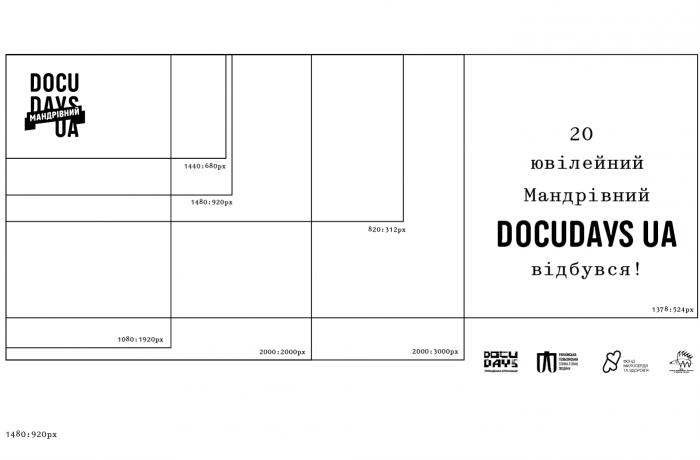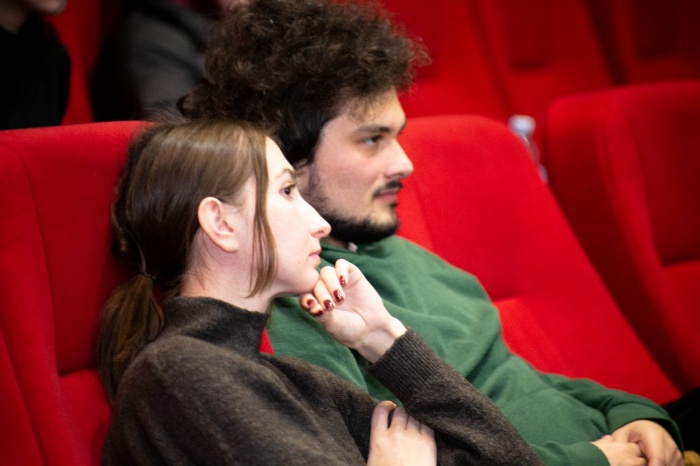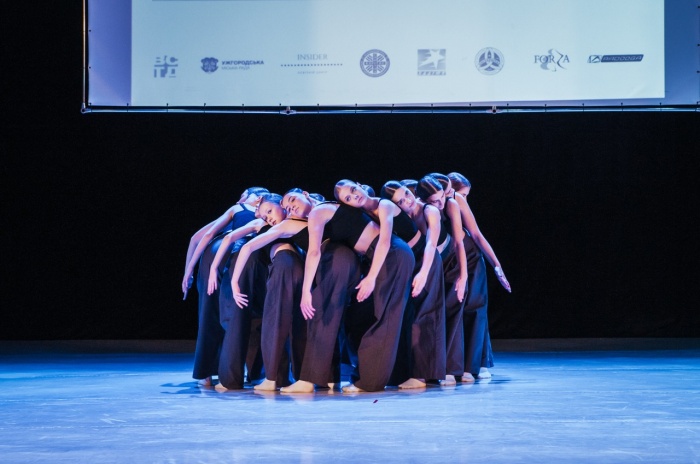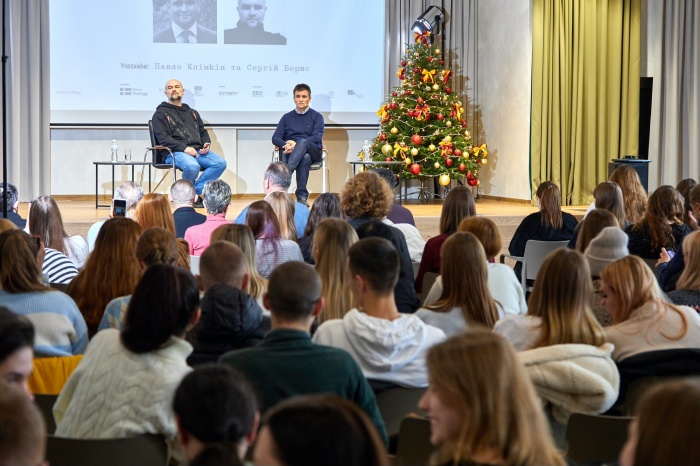
The Travelling Docudays UA brings people together, encourages them to act, helps them find like-minded people, learn about the stories of people around them and share their own stories. Everyone is now involved in Ukraine’s future victory and needs a conversation about the reality around us and about planning our future lives. It is an opportunity to build a dialogue about human rights through cinema. This year, the organisers and the audience came together to discuss and create our shared “image of the future.” It is what they searched for and what they reflected on after watching films, participating in discussions and special events.
The programme of this year’s Travelling Festival included 19 films from 13 countries: Ukraine, Switzerland, France, Belgium, Germany, Poland, Italy, Denmark, Czech Republic, Ireland, UK, US, Canada. 7 Ukrainian and 12 foreign films, 9 features and 10 shorts. 6 international films have roots in our context. They are Ukrainian co-productions with German, Polish, and American partners.
Film screening within the Travelling Docudays UA in Lviv region
One of the films in this year’s programme was included in the Oscar shortlist in the Documentary category — it was Apolonia, Apolonia by the Danish filmmaker Lea Glob about 13 years of an artist’s life and work. Audiences in Kharkiv and Kremenchuk had an opportunity to talk to the film’s author and the protagonist online.
Film directors and protagonists travelled around Ukraine (and beyond). In total, there were 58 meetings, including 35 in the format of online invitations of filmmakers and 23 offline events, full of warmth and deep conversations. The film that travelled the most actively was King Lear: How We Looked for Love During the War by Dmytro Hreshko, a film about theatre amateurs who ended up in Uzhhorod after the beginning of the full-scale invasion. The regional coordinators Maria Mendzhul and Maria Symkovych made sure that the screening took place in the same space where the play was filmed.
Opening of the Travelling Docudays UA in Uzhhorod
In-person guests at festival events were not all Ukrainian. For example, the city of Kilkenny in Ireland, where Ukrainian community lives, was visited by the renowned documentary filmmaker Neasa Ní Chianáin, the author of Young Plato. Despite the difficult journey and icy roads, Polish filmmaker Piotr Pawlus visited the screening and discussion of his film In Ukraine in four cities: Uzhhorod, Ivano-Frankivsk, Ternopil, and Chortkiv. Matt Sarnecki, an American director, also participated in an online conversation about his film The Killing of a Journalist and the topic of restoring justice.
Accessibility is an important practice which is developed and consistently implemented by the project team. It involves creating films with audio descriptions, organising events in accessible spaces, and regular thematic communication. The 20th Travelling Festival included a screening of Ptitsa by Alina Maksymenko in Poltava for people with vision impairments, an Inclusivity Day event in Kharkiv accompanied by a screening and discussion of Oasis by Justine Martin, as well as a seminar and an accessibility tour in Uzhhorod.
To improve accessibility, the films and discussions of the Travelling Festival were demonstrated and streamed in the DOCUSPACE Online Cinema: 19 film releases, a livestream with the director Matt Sarnecki about Justice Through Cinema, and three human rights discussions from RIGHTS NOW!
The special event of this year’s festival were screenings of the film Kherson Unconquered from our partners, the Vgoru Media Platform. It is a film about the work of Khersonian journalists. Since the beginning of the full-scale invasion, the publication’s reporters recorded everything that was going on in the city. Together with other Khersonians, they survived the capture of the regional capital by russians, rallies, occupation, and the liberation of their home city. The film includes unique footage which shows what the past year and a half was like for Kherson and its residents. The Vgoru team — director Ustyn Danchuk, journalists Liza Zharkykh and Iryna Ukhvarina, and the Media Platform’s director Ilona Korotitsyna — visited Boryspil, Ivano-Frankivsk, Vyshnivets, Chortkiv, Kremenchuk, Kryvyi Rih, and Kherson twice. In six other cities and villages, we successfully created an emotional and fruitful online conversation.
Three coordinators united their regions and conducted a joint video conference. Hryhoriy Kurachytskyi from Mariupol, currently based in Dnipro; Oleh Okhredko from Berdyansk, who relocated the festival to Chornomorsk this year; and Yuriy Chumak from Chuhuyiv, currently based in Cherkasy, brought their audiences together online to watch and discuss the film 89 Days together. They were joined by the film director Pavlo Dorohoi from Kharkiv. The films were traditionally screened at hubs, schools, libraries, cultural centres. New formats emerged: in addition to the usual screenings, there were creative workshops, training sessions, city tours, photography competitions, and a small-scale concert by the documentary therapy project WARNIAKANNIA in Kremenchuk.
A conversation with the heroine of the film Apolonia, Apolonia after the screening in Kremenchuk
In Kharkiv, the DOCU/SYNTHESIS Interdisciplinary Art Programme presented an audio installation based on a project by the Lviv Center for Urban History Documenting the Experiences of War: Diaries and Dreams of the War. The visitors of the art space listened to personal stories of people from different corners of Ukraine.
The future is impossible without the knowledge of history, so the Festival team carried out a special project Love, Truth, and Videotapes: memories about the 20 years of the Travelling Docudays UA. It is a collection of six conversations with regional coordinators: with Viktoria Veres about the challenges of the festival abroad; with Nina Khoma about human rights and achieving justice; with Yevhenia Bardiak about how the Security Service and the authorities interfered with the Travelling Festival during Yanukovych’s presidency; with Andriy Volyk about biases and the Travelling Festival in communities; with Volodymyr Khanas about prominent figures; and with the Festival’s founders Gennady and Igor Kofmans about how the Travelling Docudays UA was born. The interviews are available on the website of LiRoom, a partner publication of the Festival, a media about new Ukrainian culture.
How can each of us help rebuild Ukraine? What kind of support can Ukraine expect and what should be the foundations of our country’s development? The Travelling Festival looked for answers in the Lugano Declaration, which is based on seven principles which define the beginning of the process of recovery, its criteria and methods.
Discussion with Pavlo Klimkin and Serhiy Boris as part of the Travelling Docudays UA Human Rights Programme
In partnership with the RIGHTS NOW! Human Rights Programme, three discussions were organised in different Ukrainian cities: Uzhhorod, Ivano-Frankivsk, and Kremenchuk. The participants discussed the subject of Ukraine’s Recovery: How Citizens Can Influence Government Decision Making together with Oleksandr Solontay, the director of Practical Policy Programmes at the Institute for Political Education and a co-developer of the Lugano Principles, and Vitaliy Selyk, the director of CF Brave and co-founder of the volunteer initiative Brave to Rebuild. Another discussion was about Future Peace and Security: What Will the World Without Russia Be Like?, where the guests were Pavlo Klimkin, a Ukrainian diplomat and Ukraine’s Minister of Foreign Affairs in 2014–2019; and Serhiy Borys, the editor of the Course media. The third discussion, titled How to Start Building a Strong Country Right Now? concerned the subjects of culture and decolonisation; the guests were the Festival’s old friends Mykola Davydiuk, a political scientist and author of the books How the Putinist Propaganda Works and How to Make Ukraine Successful; and Anton Slepakov, the leader of the band VHNVZH and one of the authors of the charity music project WARNIAKANNIA.
The Travelling Docudays UA concluded with a screening and discussion of Young Plato by Neasa Ní Chianáin and Declan McGrath in Ternopil on 27 December. The authors of the Irish film reflect on contemporary Belfast and the experience of trauma, which resonated with Ukrainian audiences.
Read more about the travels of this year’s Docudays UA on the project website. The project team will also summarise their travels in detailed numbers soon.
Photos: Dmytro Shatskyi, Vitaliy Dyachuk, Yaroslav Dyulenko, Ksenia Oprya, Kostyantyn Botyhin.
_______________
The 20th Travelling Docudays UA is held with the support of the Embassy of Sweden in Ukraine, Embassy of Switzerland in Ukraine, US Embassy in Ukraine. The opinions, conclusions or recommendations do not necessarily reflect the views of the governments, charities, or companies of these countries. Responsibility for the contents of the material lies solely on its authors.
Docudays is a non-profit NGO which implements cultural and educational projects on the intersection of cinema and human rights in Ukraine and abroad. These include the Docudays UA International Human Rights Documentary Film Festival and the Travelling Docudays UA International Human Rights Documentary Film Festival, the DOCU/CLUB Docudays UA Human Rights Media Education Film Club Network, RIGHTS NOW! Human Rights Programme, DOCUSPACE Online Cinema, DOCU/PRO Programme for the development of the Ukrainian film industry and the DOCU/CLASS Documentary Workshop, as well as the DOCU/SYNTHESIS Interdisciplinary Art Programme and the Ukraine War Archive, launched in collaboration with the INFOSCOPE initiative.